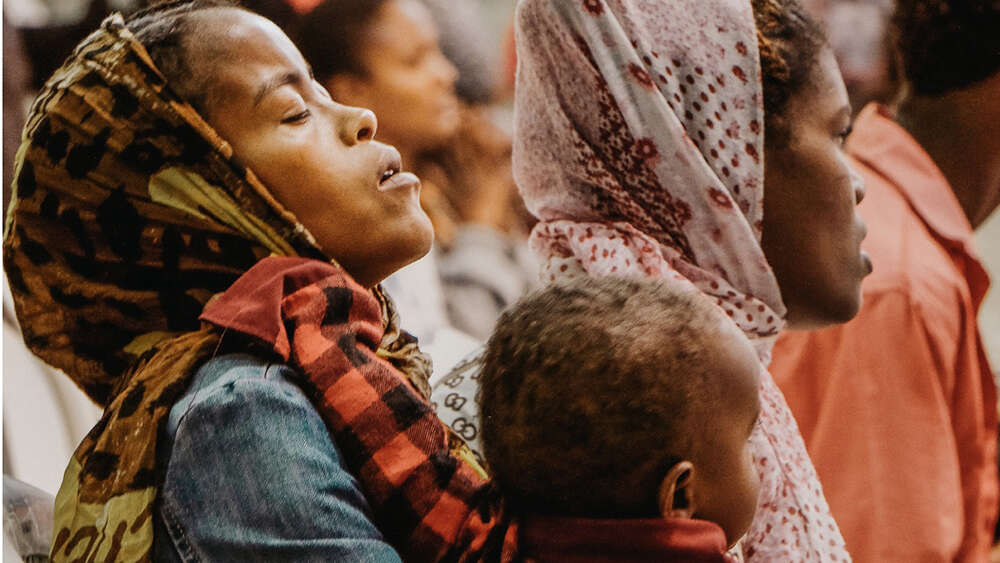COVID's burden has fallen on women more than men
Women’s suffering is hidden behind closed doors
A “hidden pandemic” of human rights violations against women, is revealed in a new report released by Open Doors, a Christian organisation that works globally to resist persecution.
The 2021 Gender-Specific Religious Persecution (GSRP) Report found a growing incidence of gender-based violence, abduction and trafficking, towards Christian women and girls across Africa, Asia, the Middle East and Latin America.
The findings include:
- Gender-specific persecution occurs at a higher rate in countries experiencing conflict, where women are more likely to be trafficked or forced to flee.
- A significant spread in trafficking of women and girls, forcing them into marriages or sexual slavery.
- A continued rise in reports of sexual violence.
- 90 per cent of countries on the 2021 World Watch List reported incidents of forced marriage, usually as a means of pressuring Christian converts to return to their family or majority community religion.
According to the report, domestic violence has been increasingly used as a tool to control women, particularly Christian converts, during a year of global lockdown. One persecution worker in the Central African Republic (who cannot be named) says: “This violence is a persecution weapon, a way of making Christian women vulnerable and traumatising the community.”
Open Doors Australia and New Zealand Communications Specialist Kimberley Linco comments: “This report reveals a devastating reality for millions of Christian women across the world. By targeting women, persecutors hope to cause the highest amount of damage to the Christian community, with the lowest risk to themselves.”
“It’s a low risk for persecutors to target women because violence against women is often socially normalised.”- Kimberley Linco
Persecution facing Christian women and girls tend to be more hidden compared to the public visibility facing men. Persecution towards women often occurs in the home behind closed doors. Tragically, in many countries, the top pressure points for women have become so culturally accepted that perpetrators make little to no attempt to hide their actions.”
Linco continues: “It’s a low risk for persecutors to target women because violence against women is often socially normalised. In some countries, it can be difficult for Christians to challenge a crime because they are often faced with counter accusations.”
The report finds that the COVID pandemic caused “deadly violence, targeted seduction and physical attacks, [to increase].”
“In domestic situations, pandemic lockdowns led to increased physical attacks on Christians isolated in their homes with hostile family members who disapprove of their faith. In Latin America and sub-Saharan Africa, criminal groups and militias exploited COVID-related vulnerabilities and intensified their criminal activity, persecuting Christians with increased impunity.”
It is a well-documented fact that rape can be used as a weapon of war.
A major issue highlighted in the report is attacks on family and marriage which provide a place of safety. Gender-specific persecution often comes in a series of linked activities. The Report provides this graphic example: “To bring down the whole community, women can be targeted and used as pawns by persecutors. By abducting Christian women and forcing them to convert, persecutors jeopardise the future generation of the unwelcome Christian community. Forced marriage, for example, undermines both the development of Christian families and raising children as Christians.”
“To weaken the core of the church community, persecutors often target daughters of pastors. Targeting women — the child bearers — in the unwanted community is a classic tactic that targets a whole community. It is a well-documented fact that rape can be used as a weapon of war. Women’s bodies essentially become the second battlefield.
“The ‘capture’ of women in a community demonstrates to the men that they were unable to ‘protect’ them. Persecutors are seen as ‘dominant’. In the midst of using these women as pawns, of course, real women are violently abused …”
“For example, in Burkina Faso, Muslim religious leaders actively encourage Ouagadougou Muslim youths to marry daughters of Christian leaders and church members because this is one of the most permanent and generational conversion tactics available.”
The Gender-Specific Religious Persecution (GSRP) Report suggest that churches worldwide should:
- Openly acknowledge the extent and severity of violence against Christian women, especially in communities under pressure for their faith;
- Pray for women who are doubly vulnerable due to their gender and faith;
- Advocate on behalf of women facing this double vulnerability;
- Seek justice for women facing any form of discrimination, persecution or violence, by:
1) Propagating a biblical understanding of God’s heart for justice, and the dignity of all humans;
2) Empowering women and men to access justice, in order to hold perpetrators to account.




